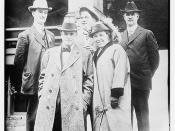"A Comparison of the Representation of the British Working Classes in the Cinema of the 1960's and the 1990's"
Throughout the history of British cinema the working class have been portrayed in many different cinematic styles. In the 1930's films like "Night Mail" showed the every day activities of the working class in the style now known as the British documentary movement. Then in 1959 the New Wave movement began with the film "Room at the Top" and later the likes of "Saturday Night, Sunday Morning" and "Billy Liar" became very popular. These films focused on the "experiences of aggressive and rebellious working class males - the so called 'angry young men'" . And in the 1990's both comedy and stark realism have been used portray the working class with films like "Brassed Off" and "Trainspotting". However, despite the variety of ways in which the working class have been portrayed there are many similarities in the actual lives of the working class.
"Representations of working class life have been circumscribed by a set of characteristics that have changed little over the years. Seen essentially as 'belonging' in the North of England or the East End of London, the working class have been repeatedly portrayed as employed in heavy manufacturing industries and / or living within close knit families or communities."
In this essay I will examine the differences and similarities between the portrayal of the working class in the New Wave of the 1950's and 1960's, and the more modern films of the 1990's. I will examine four films in detail and make use of the wealth of literature available on the topic to discuss the key issues in the films themselves and the point in British history that they were made to represent.
I will examine two...


